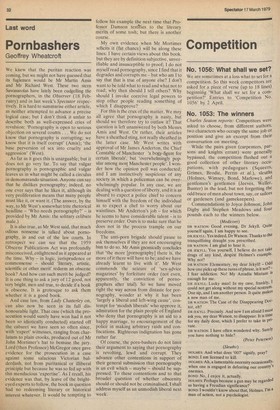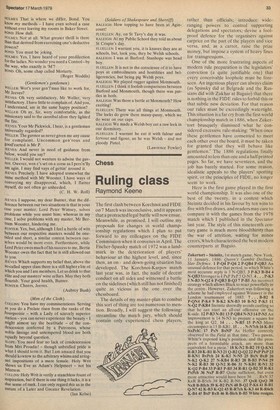Co m petit io n
No. 1056: What shall we set?
We are sometimes at a loss what to set for a competition. So this week competitors are asked for a piece of verse (up to 18 lines) beginning 'What shall we set for a competition?' Entries to 'Competition No. 1056' by 2 April.
No. 1053: The winners
Charles Seaton reports: Competitors were asked to choose, from different authors, two characters who occupy the same job or position and give an excerpt from their conversation on meeting.
While the pairs given (carpenters, parsons and knights errant) were generally bypassed, the competition flushed out a good collection of other literary occupations, with pedagogues (Squeers, Grimes, Brodie, Perrin et al.), sleuths (Holmes, Wimsey, Bond, Marlowe), and gentlemen's gentlemen (Jeeves, Weller, Bunter) in the lead, but not forgetting the odd brace of men about town, say, or sailors or gardeners (and gamekeepers). Commendations to Joyce Johnson, John Digby and Stephen Meadows and four pounds each to the winners below.
(Medicoes)
DR WATSON: Good evening, Dr Jekyll. Quite yourself again, I am happy to see. DR JEKYLL: Yes indeed, Dr Watson. Thanks to the tranquillising draught you prescribed.
DR WATSON: I am glad to hear it. DR JEKYLL: You yourself, I believe do not take drugs of any kind, despite Holmes's example. Why not? DR WATSON: Elementary, my dear Jekyll! — Odd how one picks up these turns of phrase, is it not? — I fear addiction. No! My Arcadia Mixture is enough for me. DR JEKYLL: Lucky man! In my case, frankly, I could not get along without my special nostrum. One sip, and I am another person. It quite makes a new man of me.
DR WATSON: The Case of the Disappearing Doctor, eh? DR JEKYLL: Precisely. And now I am afraid I must ask you, my dear Watson, to disappear. It is time for my daily dose, which I prefer to take in private.
(Peter Peterson) (Sleuths)
HOLMES: And what does '007' signify, pray? BOND; I am licensed to kill.
HOLMES: Ah, a lamentable necessity occasionally, when one is engaged in defeating our countrY's enemies.
BOND: No, I enjoy it, actually. HOLMES: Perhaps because a gun may be regarded as having a Freudian significance?
BOND:! wouldn't know about that, Holmes. I'm a man of action, not a psychologist.
ImEs: That is where we differ, Bond. You know my methods — I have even solved a case Without ever leaving thy rooms in Baker Street. aoND: How dull.
HolmEs: Not at all. What greater thrill is there than that derived from exercising one's deductive Powers?
BoNo: You must be joking.
LmEs: Yes, I have heard of your predilection for the ladies. No wonder you need a Control— by the way, who exactly is 'M'?
BOND: Oh, some chap called Moriarty.
(Roger Woddis) (Gentlemen's gentlemen)
\YELLER: Wot's your gen'l'man like to work for, Mr Jeeves?
PEEVES: Oh very satisfactory, Mr Weller, very satisfactory. I have little to complain of. And you, I understand, are in the same happy position? %YELLER: Oh ay, Sir, wery comfortable, as the Missionary said to the cannibal afore they lighted the fire.
PEEVES: Your Mr Pickwick, I hear, is a gentleman universally regarded?
wELLER: The guvnor as never given me any cause for complaint. Uncommon gen'rous and good'earted is Mr P.
ZEvEs: And never in need of guidance from below, would you say?
WELLER: I would not wenture to adwise the guyfor. Owever, wen e's set on a corse as I pers'n'lly am agin, I may find vays of gettin' around it. PEEVES: Precisely. I have adopted somewhat the same method with Mr Wooster. I have ways of conveying my disapproval, which, I flatter Myself, do not often go unheeded.
(C. H. W. Roll)
PEEVES: I suppose, my dear Bunter, that the difference between our two situations is that in your case your master, Lord Peter Wimsey, solves Problems while you assist him; whereas in my case, I solve problems with my master, Mr Bertram Wooster, hindering me.
BUNTER: Yes, but, although I feel a battle of wits between our respective masters would be onesided and short, a similar contest between ourselves would be more even. Furthermore, while Lord Peter owes much of his success to me, Bertie Wooster owes the fact that he is still allowed out to you.
PEEVES: Which supports my belief that, above the so-called upper class there is a still higher elite of Which you and I are members. Let us drink to that elite and our masters' wine cellars. May they both flourish. Your good health, Bunter.
BUNTER: Cheers, Jeeves.
(Aubrey Bush) (Men of the Cloth)
COLLINS: You have my commiserations. Serving as you do a Prelate risen from the ranks of the bourgeoisie — with a Lady of scarcely superior station — you can never experience the beauty — I might almost say the beatitude — of the condescension conferred by a Patroness, whose noble lineage and untempered blood are both equally beyond question.
SLOPE: You need fear no lack of condescension from Mrs Proudie! — though unbridled pride is What I should term it. But I am amazed that you Should kowtow to the arbitrary whims and armgant impositions of a mere female. Holy Writ shows us Eve as Adam's Helpmeet — not his Mistress.
COLLINS: Holy Writ is verily a stanchless fount of inspiration, but if there is one thing it lacks, it is a due sense of rank. I can only regard this as in the nature of a Later and Greater Revelation.
(Ian Kelso)
(Soldiers of Shakespeare and Sherrill) RALEIGH: How topping to have been at Agincourt!
FLUELLEN: Ay, on St Tavy's day it was. RALEIGH: At my Public School they told us about St Crispin's day.
FLUELLEN: I warrant you, it is knaves they are at schools, but, look you, they be Welsh schools. RALEIGH: I was at Barford. Stanhope was head boy.
FLUELLEN: It is not in the conscience of it to have poys at embroilments and hostilities and belligerencies, but being pig Welsh poys. RALEIGH: We played rugger against Monmouth. FLUELLEN: I think it foolish'comparisons between Barford and Monmouth, though there was patties in both.
RALEIGH: Was there a battle at Monmouth? How exciting!
FLUELLEN: There was all things at Monmouth. The leeks do grow there massy-passy, which we do wear on our caps.
RALEIGH: We made a Welsh boy eat a raw leek in our dormitory.
FLUELLEN: I warrant he eat it with falour and fervour and figour, an he was Welsh — and not ploody Pistol.
(Lawrence Fowler)









 Previous page
Previous page